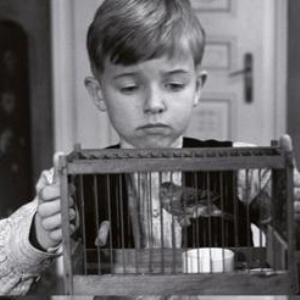Michael Haneke: Filmmaker of Bad Faith
BY Thom Donovan

This past weekend I saw Austrian director Michael Haneke’s newest film, The White Ribbon. Seeing any film by Haneke I go to it with a mild feeling of dread. His films are hard to watch; they often engage disturbing social circumstances and the threat of the unknown. Ultimately, if I had to say they were “about” anything, I would say they are about ressentiment—and specifically the bad faith of our quotidian lives. There is a moral consciousness at work in Haneke’s films, one that delves deep into the Austrian cultural imaginary. Looming behind the work is a legacy of social repression (one thinks of Freud, but also the performances of Viennese Actionists in the 60s and 70s). His films represent the way repression erupts privately and publicly, though mostly in private—within the scene of family/community.
Haneke leaves us with the problem of ressentiment in his 2005 film Caché. In Caché, a man of Algerian descent commits suicide after the recrudescence of a childhood trauma—the loss of his parents to the French occupation of Algeria. Confronting his would-be killer, the man’s son cites “bad faith” as the true reason for his father’s death. I was reminded of Caché’s conclusion watching The White Ribbon, where Haneke shows a town brought to its knees by social repression and unchecked sexual violence just before the beginning of WWI in Austria.
At the Wikipedia page for The White Ribbon, the page quotes Haneke about the film claiming that it concerns the origins of "terrorism," whether politically or religiously motivated. Indeed the film is about terrorism, a terrorism that derives from the minor details of the way characters act and speak to one another. Haneke is best where he shows you a simple conversation turning bad, and then worse, and then unbearable. Such a conversation occurs between the doctor in the film and the midwife who is both his employee and lover, wherein the doctor explains the reasons why he no longer wants to be with her (her breath stinks from an ulcer) and she reveals that he is molesting his daughter.
I have always been squeamish about the films of Fassbinder, Bergman, and von Trier for their engagements with violence, and especially violence towards women. In their films violence seems histrionic, and often uncritically directed (though von Trier and Bergman apologists always claim to me that their films are critiquing patriarchy). Haneke, while often severe, recovers violence—the effective presentation of violence by cinema. And this, I think, is because Haneke is creating a genuinely empathic relationship among his characters and audience.
His films do not condescend as a von Trier or Bergman film do, but rather make one identify with the bad faith of its characters. How he does this is through the craft of a great storyteller and cinematographer. The flip-side of Haneke’s bad faith is a tenuous redemption Haneke proffers through his most humiliated characters. In The White Ribbon these characters—angels of mercy—are the pastor’s young son, who comes to his father bearing the gift of a caged bird after the pastor's bird has been brutally executed, and in another scene bargains with his father to keep a pet frog. The baron’s wife is also such a character, explaining to her husband why she is leaving him: because the town over which he lords is filled with malice, and threatens the well-being of their son and the happiness of their marriage.
Through such characters perhaps speaks Haneke’s own wish for a force that will interrupt reactive forces, and allow a society to transcend its vicious circles. Although Haneke rarely gives in to this wish, as the apocalyptic conclusions to many of his other films attest (The Piano Teacher, The Seventh Continent, 71 Fragments of a Chronology of Chance).
Thom Donovan lives in New York City where he edits Wild Horses of Fire weblog (whof.blogspot.com) and...
Read Full Biography

